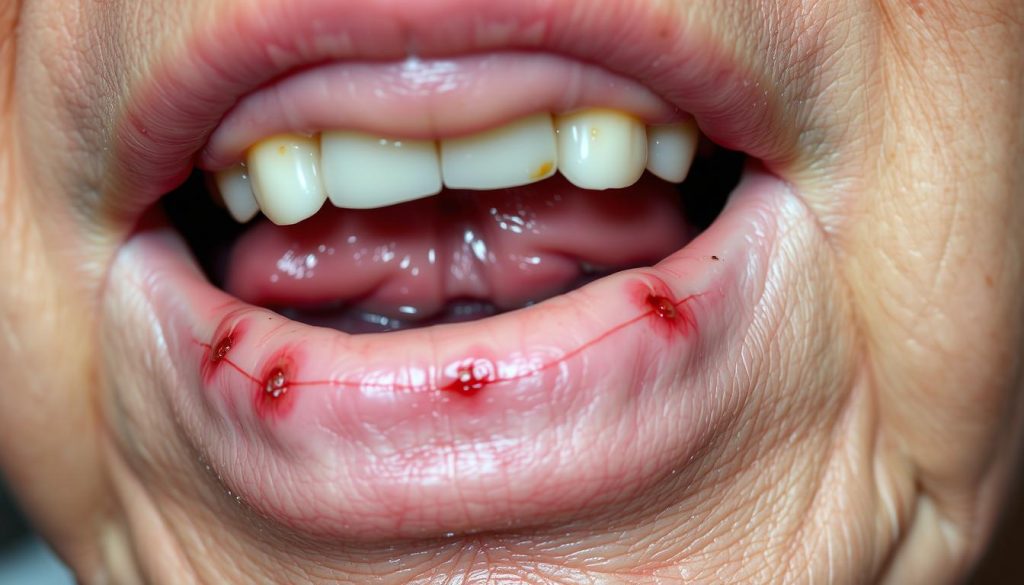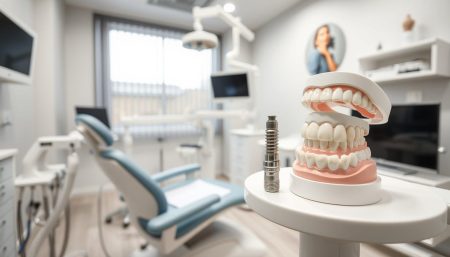Mouth cancer is a serious health issue that affects thousands of Americans each year. It can develop in different parts of the mouth, like the lips, tongue, and throat. Finding it early is key to successful treatment and better outcomes.
Knowing the risk factors and spotting early signs of mouth cancer can save lives. Head and neck cancer, which includes oral cancer, often starts with small changes in the mouth or throat. These changes might be easy to miss. By learning about these warning signs, you can take care of your oral health and get medical help if needed.
In this guide, we’ll look at the early signs of mouth cancer, common risk factors, and how to protect yourself. Whether you’re worried about your health or someone you love, this info will help you make smart choices about preventing and detecting oral cancer.
Understanding Mouth Cancer: Types and Classifications
Mouth cancer has different forms, each with its own traits. This section looks at the main types of oral cancer. Knowing these differences is key, as they affect treatment and outcomes.
Squamous Cell Carcinoma
Squamous cell carcinoma is the most common mouth cancer. It starts in the flat cells of the mouth and throat. If not treated, it can spread to lymph nodes and become throat or oropharyngeal cancer.
Verrucous Carcinoma
Verrucous carcinoma grows slowly and looks like a white, warty growth. It rarely spreads and is often caused by long-term tobacco use.
Minor Salivary Gland Carcinomas
These cancers are rare and start in small salivary glands in the mouth and throat. They can appear on the palate, inside cheeks, or in the throat. Though rare, they can grow fast and spread to nearby tissues.
| Cancer Type | Prevalence | Growth Rate | Risk Factors |
|---|---|---|---|
| Squamous Cell Carcinoma | 90% of cases | Moderate to fast | Tobacco, alcohol, HPV |
| Verrucous Carcinoma | 5% of cases | Slow | Long-term tobacco use |
| Minor Salivary Gland Carcinomas | Less than 5% of cases | Varies | Radiation exposure, genetic factors |
While these are the main types of mouth cancer, esophageal cancer is also a concern. It shares some risk factors with oral cancers. Regular dental visits and knowing symptoms are vital for early detection and treatment of all oral and throat cancers.
Common Risk Factors for Oral Cancer Development
Knowing the risk factors for oral cancer is key to catching it early and preventing it. Lifestyle choices and genetics can up the chances of getting mouth cancer. This includes cancers of the salivary glands, tongue, and lips.
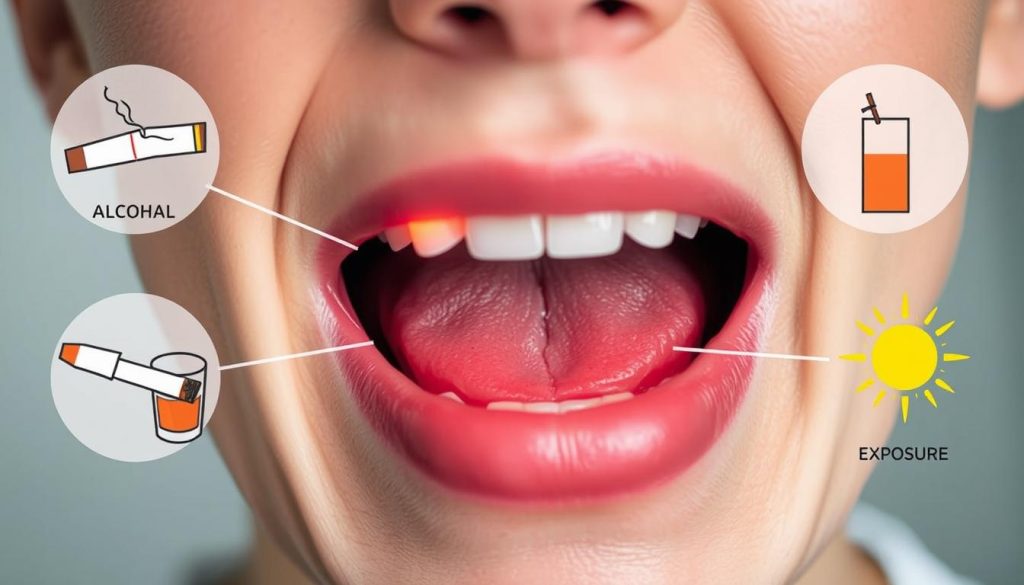
Tobacco is the top cause of oral cancer. Smoking or using smokeless tobacco products greatly increases the risk. Drinking alcohol, too, raises the danger, even more so when combined with tobacco.
Being out in the sun for a long time can lead to lip cancer. People who work outside or spend a lot of time in the sun without protection are at higher risk. Genetics also play a part, with some people more likely to get oral cancers due to their DNA.
HPV infection is linked to a higher risk of tongue cancer and other oral cancers. Not taking care of your mouth and eating too few fruits and veggies can also increase your risk.
| Risk Factor | Associated Cancer Types | Risk Level |
|---|---|---|
| Tobacco Use | All oral cancers | High |
| Alcohol Consumption | All oral cancers | Moderate to High |
| Sun Exposure | Lip cancer | High |
| HPV Infection | Tongue cancer, Oropharyngeal cancer | Moderate |
| Genetic Factors | Salivary gland cancer, Various oral cancers | Varies |
By understanding these risk factors, people can lower their chances of getting oral cancer. They should also get regular check-ups for early detection.
Early Warning Signs and Symptoms of Mouth Cancer
Spotting oral cancer early can save lives. Gum cancer and other mouth cancers often start with small changes. Knowing these signs can help find cancer early and improve treatment.
Persistent Mouth Sores
Watch for persistent mouth sores as an early sign. Unlike common canker sores, cancerous sores don’t heal quickly. If a sore in your mouth lasts more than three weeks, see a dentist or doctor.
Unexplained Bleeding
Unexplained bleeding in the mouth can be a sign of gum cancer or other oral cancers. This might happen when brushing teeth or eating. Any ongoing bleeding needs a quick check by a healthcare professional.
Changes in Oral Sensation
Oral cancer can change how your mouth feels. You might feel numbness, tingling, or pain in your lips, tongue, or mouth. These feelings can be constant or come and go.
Voice Changes and Hoarseness
Changes in your voice can also signal oral cancer, even if it’s not in your mouth. Persistent hoarseness or feeling like something’s stuck in your throat could be signs. If these symptoms last over two weeks, get medical help.
Remember, catching oral cancer early is key to better treatment. Regular dental visits and self-checks are important for finding issues early.
Identifying Suspicious Patches and Lesions
Spotting early signs of mouth cancer is key. Dentists and patients should watch for odd changes in the mouth. Look for patches or lesions that stand out from the rest.
Red or white patches in the mouth are signs to watch. These can show up on the tongue, gums, or cheeks. Not all patches mean cancer, but they need a doctor’s check.
- Look for persistent sores or ulcers that don’t heal within two weeks
- Notice any unexplained lumps or thickening of oral tissues
- Pay attention to rough or crusty spots in the mouth
- Be aware of velvety white or red areas on oral surfaces
Doing self-checks helps catch mouth cancer early. Use a mirror and bright light to check your mouth. Look under the tongue and the roof of your mouth. If you see something odd, see a dentist right away.
Spotting odd patches or lesions early can help a lot. Keep up with your oral health. Make sure to see your dentist regularly for cancer screenings.
The Link Between HPV and Oral Cancer
HPV-related oral cancer is a growing concern. It’s also known as oropharyngeal cancer and is linked to the human papillomavirus (HPV). Knowing about this link is key for prevention and early detection.
Vaccination Prevention
Vaccination is a big help in stopping HPV-related oral cancer. The HPV vaccine is given to teens and can lower the risk of oropharyngeal cancer later. HPV vaccination is recommended for both boys and girls to prevent it.
Risk Assessment
Figuring out your risk for HPV-related oral cancer involves looking at a few things:
- Sexual behavior and history
- Smoking habits
- Alcohol consumption
- Weakened immune system
Knowing these risk factors helps you make better health choices.
Testing and Screening
Regular tests and screenings are key for catching oropharyngeal cancer early. Dental professionals are important in spotting signs during check-ups. If you notice any lasting changes in your mouth or throat, get medical help right away.
| Screening Method | Frequency | Effectiveness |
|---|---|---|
| Visual and Physical Examination | Annually | High for visible lesions |
| HPV DNA Test | As recommended | Excellent for HPV detection |
| Brush Biopsy | When suspicious lesions are present | Good for initial assessment |
Lifestyle Factors That Increase Mouth Cancer Risk
Knowing about mouth cancer risk factors is key to preventing it. Some lifestyle choices can greatly increase your risk. Let’s look at the main factors that raise this risk.
Tobacco use is a big risk factor for mouth cancer. Smoking or chewing tobacco harms your mouth’s tissues. It’s dangerous because it directly touches the soft tissues in your mouth.
Drinking too much alcohol is also a concern. It can irritate your mouth’s lining and cause cell changes. When you add tobacco to alcohol use, the risk goes up even more.
Your diet affects your risk of oral cancer too. Eating fewer fruits and vegetables can increase your risk. These foods have antioxidants that protect your cells.
| Lifestyle Factor | Risk Level | Prevention Strategy |
|---|---|---|
| Tobacco Use | High | Quit smoking, avoid all tobacco products |
| Alcohol Consumption | Moderate to High | Limit intake, avoid binge drinking |
| Poor Diet | Moderate | Eat more fruits and vegetables |
| Sun Exposure | Moderate | Use lip balm with SPF, wear hats |
Too much sun can cause lip cancer, a type of oral cancer. Protect your lips with SPF lip balm and stay out of direct sunlight. Changing your lifestyle can greatly lower your risk of mouth cancer.
Diagnostic Procedures for Mouth Cancer
Getting an accurate diagnosis for mouth cancer is key to effective treatment. Doctors employ various methods to detect and confirm the presence of mouth cancer. Let’s dive into the main diagnostic procedures used in screening for mouth cancer.
Oral Examination Methods
The first step in diagnosing oral cancer is a detailed visual and physical exam. Your doctor will search for any unusual signs in your mouth and check for lumps or odd textures. They might use special dyes or lights to spot cancerous areas more easily.
Biopsy Procedures
If your doctor finds something suspicious, a biopsy is required to confirm the diagnosis. There are different types of biopsies used in mouth cancer screening:
- Brush biopsy: A less invasive method that collects cells for examination
- Incisional biopsy: Removal of a small piece of tissue for testing
- Excisional biopsy: Complete removal of a small tumor or lesion
Imaging Tests
Advanced imaging techniques are essential in diagnosing oral cancer. These tests help figure out how far the cancer has spread:
| Imaging Test | Purpose |
|---|---|
| X-rays | Detect bone involvement |
| CT scans | Create detailed 3D images of the mouth and neck |
| MRI | Provide high-resolution soft tissue images |
| PET scans | Identify cancer spread throughout the body |
Early detection through regular screening can greatly improve treatment outcomes. If you notice any persistent changes in your mouth, it’s important to get a professional evaluation.
Treatment Options and Success Rates
Oral cancer treatment has made big strides, giving hope to those diagnosed. The treatment plan depends on the cancer’s stage, where it is, and the patient’s health.
Surgery is often the first choice. Doctors might take out tumors and affected tissue. They might also rebuild parts of the mouth to keep it working right.
Radiation therapy uses beams to kill cancer cells. Chemotherapy uses drugs to fight cancer all over the body.
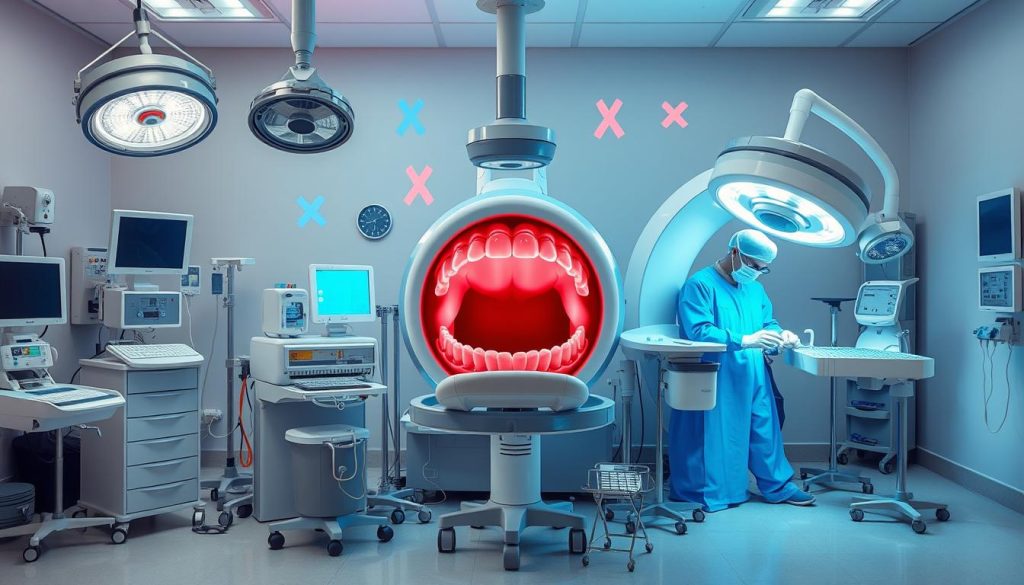
New treatments like immunotherapy are showing great promise. They help the body fight cancer better. Targeted therapies aim at specific traits of cancer cells, which might mean fewer side effects.
Mouth cancer survival rates depend on several things:
- Stage at diagnosis
- Type of cancer
- Location in the mouth
- Patient’s overall health
- Response to treatment
Early detection is key. The five-year survival rate for early-stage mouth and throat cancers is about 85%. This shows how important regular check-ups are.
| Stage | 5-Year Survival Rate |
|---|---|
| Localized | 85% |
| Regional | 66% |
| Distant | 40% |
While these numbers give a general idea, remember that every case is different. New advances in oral cancer treatment are helping patients live better lives, even after treatment.
Prevention Strategies and Regular Screening
Preventing oral cancer and screening for mouth cancer are key to early detection and better outcomes. By taking proactive steps, you can lower your risk and find problems early.
Self-Examination Techniques
Regular self-exams are vital for preventing oral cancer. Use a bright light and mirror to check your mouth each month. Look for any unusual lumps, sores, or color changes on your lips, gums, tongue, and cheeks. Also, check your neck and jaw for swollen lymph nodes.
Professional Check-ups
Regular dental visits are important for mouth cancer screening. Dentists can find early signs you might miss. Visit your dentist every six months, or more often if you’re at higher risk. During these visits, your dentist will examine your mouth and throat thoroughly.
Lifestyle Modifications
Healthy choices can help lower your risk of oral cancer. Quit smoking and drink less alcohol. Eat a diet full of fruits and vegetables. Use SPF lip balm to protect your lips from the sun. Also, consider getting the HPV vaccine to lower your risk of HPV-related oral cancers.
| Prevention Strategy | Benefit | Frequency |
|---|---|---|
| Self-examination | Early detection of abnormalities | Monthly |
| Dental check-ups | Professional screening and detection | Every 6 months |
| Quitting tobacco | Significant risk reduction | Immediate and ongoing |
| Limiting alcohol | Decreased oral cancer risk | Daily |
| Healthy diet | Improved overall oral health | Daily |
The Role of Dental Professionals in Early Detection
Dental professionals are key in catching mouth cancer early. Regular dental visits are essential for oral cancer screening. Your dentist does more than just check your teeth – they’re trained to spot signs of oral cancer too.
During a routine exam, dentists look for unusual changes in your mouth. They check your lips, gums, tongue, and throat. Any odd patches or sores get a closer look. This careful inspection is part of every dental checkup.
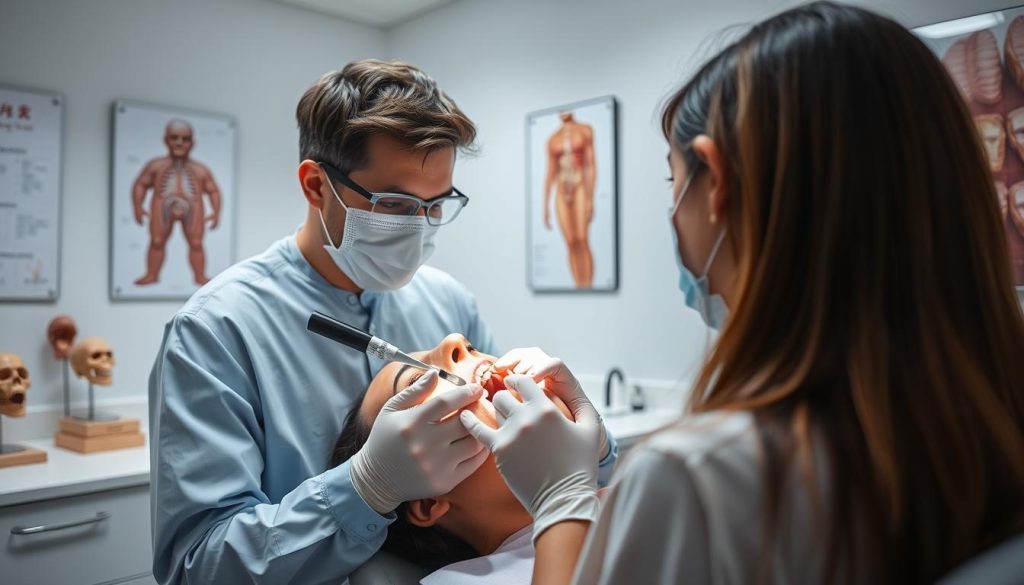
Dentist cancer detection skills save lives. They can spot issues before symptoms appear. Early detection means better treatment outcomes. That’s why skipping dental visits is risky.
| Screening Area | What Dentists Look For |
|---|---|
| Lips and Cheeks | Unusual lumps or color changes |
| Tongue | White or red patches |
| Floor of Mouth | Swelling or tenderness |
| Throat | Persistent sore throat or difficulty swallowing |
If something seems off, your dentist might suggest more tests. They work with other doctors to ensure you get proper care. Remember, dental pros are your first line of defense against oral cancer. Don’t skip those checkups!
Recovery and Rehabilitation After Treatment
Mouth cancer recovery is a journey of healing and learning. Patients face many challenges as they try to regain their function and confidence. Oral cancer rehabilitation programs provide a lot of support. They help with speech, nutrition, and physical health.
Speech Therapy
Speech therapy is very important for mouth cancer recovery. Patients often have trouble speaking clearly and with the right voice tone after treatment. Therapists use special exercises to help improve muscle control and coordination.
These sessions help patients rebuild their communication skills. This boosts their confidence and improves their quality of life.
Dietary Adjustments
Nutrition is a big part of oral cancer rehabilitation. Many patients have trouble eating because of treatment side effects. Dietitians make special meal plans for them.
These plans focus on foods that are full of nutrients and easy to swallow. Dietitians might also suggest changing the texture of food or using special utensils to make eating easier.
Physical Rehabilitation
Physical therapy is key for getting back to normal. It helps with jaw movement, facial muscles, and neck stiffness. Therapists use massage and stretching to help reduce scar tissue and improve movement.
This part of rehabilitation helps patients become more independent in their daily lives.
| Rehabilitation Area | Common Challenges | Treatment Approaches |
|---|---|---|
| Speech | Articulation issues, voice changes | Vocal exercises, resonance therapy |
| Nutrition | Difficulty swallowing, taste changes | Texture-modified diets, swallowing techniques |
| Physical | Limited jaw movement, facial weakness | Targeted exercises, manual therapy |
Mouth cancer recovery is a complex process. With the right oral cancer rehabilitation, patients can overcome many challenges. Support from healthcare professionals and loved ones is very important during this time.
Support Systems and Resources for Patients
Facing mouth cancer can feel overwhelming, but you’re not alone. Many oral cancer support groups and mouth cancer resources are here to help. They support patients and their families on this tough journey.

Support groups are a safe place to share your story. You can talk about your fears and successes with others who get it. These groups meet in person or online, making it easy for everyone to join.
Local hospitals host meetings, and national groups offer online support. This way, everyone can find a group that fits their needs.
Counseling services are also key. They help with emotional stress, body image issues, and changes in relationships. Many cancer centers include counseling in their care plans.
Online platforms are full of helpful information and support. Websites from trusted cancer organizations have educational materials, treatment guides, and forums. Some top mouth cancer resources include:
- National Cancer Institute’s Oral Cancer Page
- Oral Cancer Foundation’s Patient Support Forum
- CancerCare’s Oral Cancer Support Services
Financial aid programs can also help. Social workers at cancer centers can help find resources for financial help, transportation, and home care.
| Resource Type | Benefits | Where to Find |
|---|---|---|
| Support Groups | Emotional support, Shared experiences | Hospitals, Cancer centers, Online forums |
| Counseling Services | Mental health support, Coping strategies | Cancer centers, Private practices |
| Online Resources | Information, Education, Community | Cancer organization websites |
| Financial Aid | Cost assistance, Practical support | Social workers, Non-profit organizations |
Remember, asking for help is a sign of strength, not weakness. These resources are here to help you on your cancer journey.
Latest Research and Treatment Developments
Oral cancer research is moving forward fast, bringing new hope to patients. New treatments and ongoing clinical trials are leading to better therapies.
Immunotherapy Advances
Immunotherapy is a new hope in fighting oral cancer. It uses the body’s immune system to attack cancer cells. Early trials show promising results, with some patients seeing big improvements.
Targeted Therapies
Targeted therapies target specific genetic changes in oral cancer. They aim to stop cancer cells from growing and spreading. New research has found more targets, leading to treatments tailored to each patient.
Clinical Trials
Many clinical trials are testing new treatments for mouth cancer. These studies help us understand oral cancer better and find more effective treatments.
| Treatment Type | Current Focus | Potential Benefits |
|---|---|---|
| Immunotherapy | Checkpoint inhibitors | Enhanced immune response |
| Targeted Therapy | EGFR inhibitors | Reduced tumor growth |
| Combination Therapy | Immunotherapy + Chemotherapy | Improved survival rates |
As research advances, these new treatments give patients hope for better outcomes and a better life.
Impact on Quality of Life
Mouth cancer survivorship comes with its own set of challenges. These can change how a person looks and affects basic actions like speaking and eating. Such changes can make someone feel less confident and anxious in social situations.
Emotional health is also a big part of living with mouth cancer. Survivors often worry about cancer coming back, feel sad, and anxious. Getting help from professionals and connecting with others who have gone through the same can be very helpful.
Even with the tough times, many survivors find joy in life again. They learn to adapt, set new goals, and grow as individuals. This can lead to a deeper appreciation for life and stronger bonds with family and friends. With the right support, survivors can live a fulfilling life.
FAQ
Q: What are the early signs of mouth cancer?
A: Early signs of mouth cancer include mouth sores that don’t heal and bleeding without reason. You might also notice changes in how your mouth feels or sounds. Look out for trouble swallowing, ear pain, and changes in the color or texture of your mouth tissues. If you see any of these, see a doctor right away.
Q: Who is at risk for developing mouth cancer?
A: Many things can increase your risk of mouth cancer. Using tobacco, drinking a lot of alcohol, and being in the sun too much are big risks. Eating few fruits and veggies and having HPV also raise your risk. Men over 50 are more likely to get it, but anyone can get mouth cancer.
Q: How is mouth cancer diagnosed?
A: Doctors use several ways to find mouth cancer. First, they do a detailed check of your mouth. If they find something odd, they might take a biopsy. This means they take a small piece of tissue for tests.
They might also use X-rays, CT scans, MRI, or PET scans. These help figure out how big the cancer is and if it has spread.
Q: What are the treatment options for mouth cancer?
A: Treatment for mouth cancer depends on the cancer’s type and how far it has spread. Doctors might remove the tumor with surgery, use radiation, or give you chemotherapy. Sometimes, they use a mix of these treatments.
New treatments like immunotherapy and targeted therapies are also being tried. The best treatment plan is one that fits your specific situation and health.
Q: Can mouth cancer be prevented?
A: While you can’t prevent all mouth cancers, there are steps to lower your risk. Quitting tobacco, drinking less alcohol, and protecting your lips from the sun are key. Eating well, brushing your teeth regularly, and getting HPV shots can also help.
Going to the dentist and doing self-exams can catch cancer early.
Q: How often should I have an oral cancer screening?
A: You should get an oral cancer screening once a year at your dental check-up. If you use tobacco or have had mouth cancer before, your dentist might want to see you more often. Doing self-exams every month can help you spot changes between dental visits.
Q: What is the survival rate for mouth cancer?
A: Survival rates for mouth cancer depend on when it’s found and what type it is. Finding it early can greatly improve your chances. The five-year survival rate for mouth and throat cancers is about 66%.
But if caught early, the survival rate can be as high as 85%. Remember, these are general numbers, and your outcome can be different.
Q: How does HPV relate to mouth cancer?
A: HPV is linked to more cases of mouth cancer, mainly in the back of the tongue and tonsils. HPV-16 is the most common cause. The good news is that HPV-related mouth cancers often respond well to treatment.
Getting an HPV vaccine, even when you’re young, can help prevent these cancers.
Q: What should I expect during recovery from mouth cancer treatment?
A: Recovering from mouth cancer treatment can be tough. You might need speech therapy, changes in your diet, and physical therapy to get back to normal. Emotional support is also very important.
Many people find joining support groups or talking to a counselor helps them through this time.
Q: Are there any new developments in mouth cancer treatment?
A: Yes, there are new ways to treat mouth cancer. Immunotherapy and targeted therapies are showing promise. There are also many clinical trials looking at new treatments.
These new options offer hope for better treatments and outcomes in the future.












